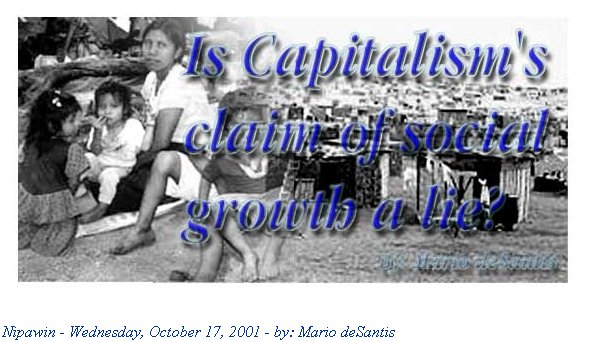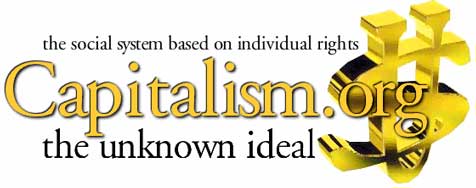Learning Stories
by
Mario deSantis
mariodesantis@hotmail.com
“I am a Canadian, free to speak without fear, free to worship in my own way, free to stand for what I think right, free to oppose what I believe wrong, and free to choose those who shall govern my country.” - -The Rt. Hon. John Diefenbaker, Canadian Bill of Rights, 1960
“The whole judicial system is at issue, it's worth more than one person.”--Serge Kujawa, Saskatchewan Crown Prosecutor, 1991
“The system is not more worth than one person's rights.”--Mario deSantis, 2002
Ensign Stories © Mario deSantis and Ensign
|
|
"Can capitalism survive? No. I do not think it can." -- Joseph A. Schumpeter "The moral justification for capitalism lies in the fact that it is the only system consonant with man's rational nature" -- Ayn Rand Our neoclassical economists tell us that we have infinite wants and that we must use the moral forces of the Free Market (Capitalism) to satisfy these infinite wants. And I ask if it is fair to a have a financial stock speculator making money at the expense of others to satisfy his infinitesimal want when three billion people live with less than $2 per day. There are wants and there are needs. The rich people of any country want wants, and the poor people of any country need needs. The neoclassical economists tell us that capitalism is the means to get richer and satisfy our wants, and I don't believe that today's capitalism is the right social tool to free billions of people from their basic needs of food and shelter. And to support that today's Capitalism is the means to make rich people richer and in the process to spread a moral void in our society I provide the following information: -Microsoft co-founders Bill Gates and Paul Allen plus Berkshire Hathaway's Warren Buffet have a net worth larger than the combined GDP of the 41 poorest nations and their 550 million people. -The UN Development Program (UNDP) reports that 80 countries have per capita incomes lower than a decade ago and that sixty countries have been growing steadily poorer since 1980. -In 1960, the income gap between the fifth of the world's people living in the richest countries and the fifth in the poorest countries was 30 to 1. By 1990, the gap had widened to 60 to 1. By 1998, it had grown to 74 to 1.
But our international renowned Peruvian economist Hernando De
Soto doesn't agree with the wrongs of today's Capitalism and says
that the poor faired quite well in the last 30 years as " in
Mexico alone... the poor today own assets worth $315 billion, seven
times the value of Pemex... In Egypt, the poor control some $245
billion of goods - 55 times the total foreign investment made in
Egypt over the last 150 years. All over the developing world, the
poor are inching toward a market society."
Our neoclassical economists continue to give us their numbers and they need protection money. So, our De Soto doesn't feel safe in his native Peru and therefore he has been peddling his economic theory of 'paperized property rights' around the globe. In the meantime, Peru has been experiencing, in the mid 90s, an external debt of some $31.7 billion, representing 465.2 percent of exports of goods and services and 53.9 percent of GDP. And the lies of today's neoclassical economists continue. References Capitalism, Socialism and Democracy, Project 2001: Significant Works in Twentieth-Century Economic History (Joseph A. Schumpeter) http://www.eh.net/bookreviews/library/mccraw.shtml The Capitalism Site http://www.capitalism.org Ownership Statistics: Why a Shared Capitalism is Needed..., Shared Capitalism Institute, Jeff Gates & Christopher Mackin, http://www.sharedcapitalism.org/scfacts.html The Constituency of Terror, by Hernando De Soto, New York Times, October 15, 2001 http://www.nytimes.com/2001/10/15/opinion/15DESO.html The Poor Man's Capitalist: Hernando de Soto, by Matthew Miller, New York Times, July 1, 2001 http://www.nytimes.com/2001/07/01/magazine/01DESOTO.html?pagewanted=1 PERU, World Bank http://www.worldbank.org/html/extdr/offrep/lac/perus.htm |


